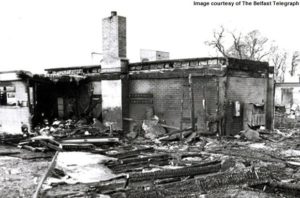
Il La Mon House, situato a Gransha – nei dintorni di Belfast -, fu oggetto di uno degli attacchi più terribili del conflitto nordirlandese. Molte delle persone decedute furono rese irriconoscibili dal divampare di una palla di fuoco.
Secondo le famiglie delle vittime gli interrogatori con gli uomini dell’IRA, i documenti originali redatti da 100 investigatori, le note sulla telefonata di avvertimento e l’automobilie utilizzata dagli attentatori non stati recupertati dagli investigatori che stanno nuovamente valutando le prove del caso.
I parenti stanno chiedendo nuovamente un’inchiesta pubblica completa sull’episodio.
Nella dichiarazione rilasciata dalle famiglie si legge: “A noi vittime sembra che documenti fondamentali siano stati rimossi dai file al fine di proteggere i membri dell’IRA che oggi potrebbero essere coinvolti al massimo livello nel processo di pace.
“Questo caso, in comune con altri grandi indagini, sembra mostrare che la volontà di scoprire la verità è stata limitata per paura di destabilizzare l’attuale processo politico”.
Robert Murphy, di West Belfast, fu condannato all’ergastolo per omicidio nel 1981. Venne rilasciato nel 1995 e morì nel 2006. Un secondo uomo fu assolto dalle accuse.
La richiesta di una nuova inchiesta segue la revisione delle indagini di polizia eseguita dall’Historical Enquiries Team (HET), che ha trasmesso un rapporto alle famiglie.
La dichiarazione delle famiglie continua: “E’ molto inquietante che l’indagine di un attacco, descritto dalla RUC come orribile e come un indiscriminato omicidio di massa, sia stata ostacolata perché importanti documenti sono stati smarriti.
“Considerando le circostanze di questo crimine orrendo e la certezza del coinvolgimento dell’IRA, le vittime sono sconvolte dalla mancanza di diligenza dimostrata da Royal Ulster Constabulary/Police Service of Northern Ireland per garantire la conservazione di tutte le informazioni relative a questa inchiesta e chiama in causa anche l’integrità e la completezza di tutto il processo di indagini storiche”.
Tratto da Derry Journal
IRA hotel bombing documents ‘lost’
La Mon House, a hotel in countryside outside Belfast, was targeted in one of the most horrific attacks of the Troubles, with many of those killed in February 1978 burned beyond recognition by a fireball.
Interviews with IRA men, original papers from up to 100 detectives and notes about a warning call and a car used by the bombers have not been recovered by independent investigators reviewing the case, according to the victims’ families.
They have now renewed calls for a full public inquiry into the bombing.
A statement issued by the families read: “It would appear to the victims that key documents were removed from the files with the view to protecting IRA members who today may be involved in the peace process at the highest level.
“This case, in common with other major investigations, appears to show that the will to uncover the truth has been curtailed for fear of destabilising the current political process.”
West Belfast man Robert Murphy was sentenced to life imprisonment for manslaughter in 1981. He was released in 1995 and died in 2006. A second man was acquitted.
The call for a new inquiry followed a review of the police investigation by the independent Historical Enquiries Team which delivered a report to the families.
The statement went on: “It is most disturbing that the investigation of an attack described by the RUC as horrific and indiscriminate mass murder has been hampered because key documentation has been mislaid.
“Considering the circumstances of this horrendous crime and the certainty of the involvement of the IRA, the victims are appalled by the absence of diligence shown by the Royal Ulster Constabulary/Police Service of Northern Ireland in ensuring the preservation of all information related to this investigation and also calls into question the integrity and thoroughness of the whole historical inquiry process.”